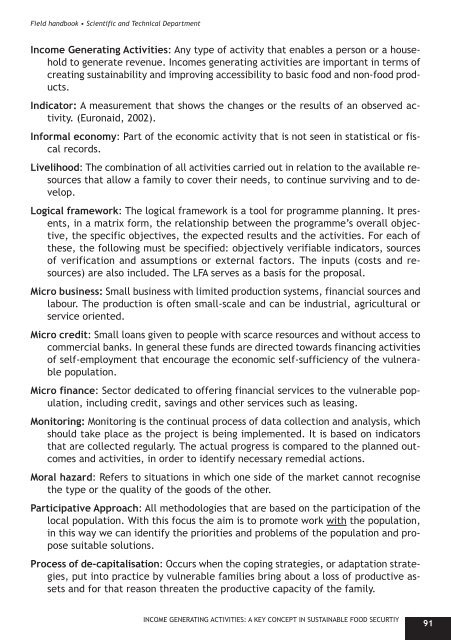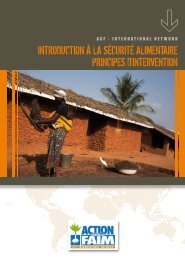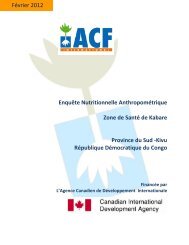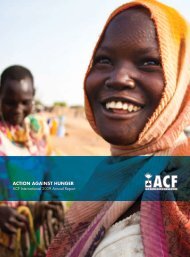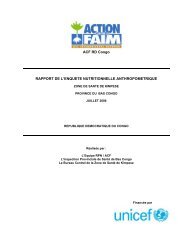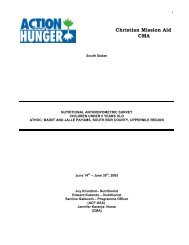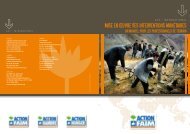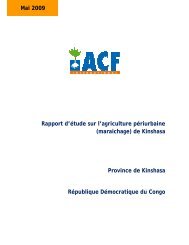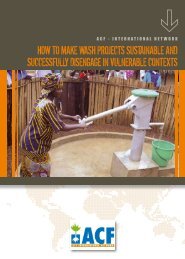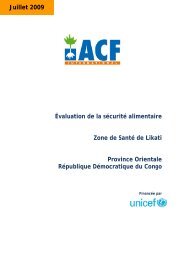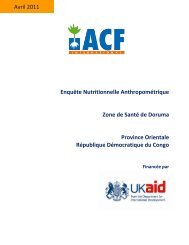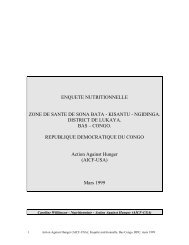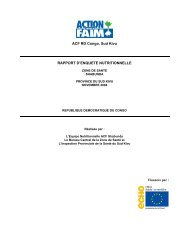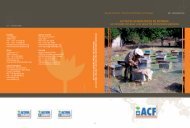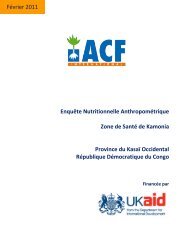Income-Generating Activities - Action Against Hunger
Income-Generating Activities - Action Against Hunger
Income-Generating Activities - Action Against Hunger
Create successful ePaper yourself
Turn your PDF publications into a flip-book with our unique Google optimized e-Paper software.
Field handbook • Scientific and Technical Department<br />
<strong>Income</strong> <strong>Generating</strong> <strong>Activities</strong>: Any type of activity that enables a person or a household<br />
to generate revenue. <strong>Income</strong>s generating activities are important in terms of<br />
creating sustainability and improving accessibility to basic food and non-food products.<br />
Indicator: A measurement that shows the changes or the results of an observed activity.<br />
(Euronaid, 2002).<br />
Informal economy: Part of the economic activity that is not seen in statistical or fiscal<br />
records.<br />
Livelihood: The combination of all activities carried out in relation to the available resources<br />
that allow a family to cover their needs, to continue surviving and to develop.<br />
Logical framework: The logical framework is a tool for programme planning. It presents,<br />
in a matrix form, the relationship between the programme’s overall objective,<br />
the specific objectives, the expected results and the activities. For each of<br />
these, the following must be specified: objectively verifiable indicators, sources<br />
of verification and assumptions or external factors. The inputs (costs and resources)<br />
are also included. The LFA serves as a basis for the proposal.<br />
Micro business: Small business with limited production systems, financial sources and<br />
labour. The production is often small-scale and can be industrial, agricultural or<br />
service oriented.<br />
Micro credit: Small loans given to people with scarce resources and without access to<br />
commercial banks. In general these funds are directed towards financing activities<br />
of self-employment that encourage the economic self-sufficiency of the vulnerable<br />
population.<br />
Micro finance: Sector dedicated to offering financial services to the vulnerable population,<br />
including credit, savings and other services such as leasing.<br />
Monitoring: Monitoring is the continual process of data collection and analysis, which<br />
should take place as the project is being implemented. It is based on indicators<br />
that are collected regularly. The actual progress is compared to the planned outcomes<br />
and activities, in order to identify necessary remedial actions.<br />
Moral hazard: Refers to situations in which one side of the market cannot recognise<br />
the type or the quality of the goods of the other.<br />
Participative Approach: All methodologies that are based on the participation of the<br />
local population. With this focus the aim is to promote work with the population,<br />
in this way we can identify the priorities and problems of the population and propose<br />
suitable solutions.<br />
Process of de-capitalisation: Occurs when the coping strategies, or adaptation strategies,<br />
put into practice by vulnerable families bring about a loss of productive assets<br />
and for that reason threaten the productive capacity of the family.<br />
INCOME GENERATING ACTIVITIES: A KEY CONCEPT IN SUSTAINABLE FOOD SECURTIY<br />
91


